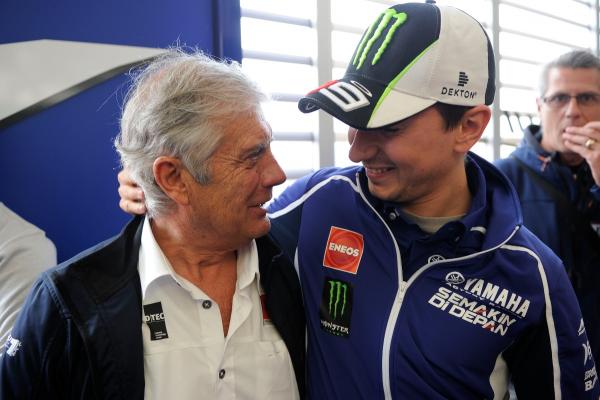
The simmering feud between grand prix champions Jorge Lorenzo and Giacomo Agostini just ratcheted up a few more degrees after the Spaniard took to social media with a critical post in which he says he’s ‘improper’ for assessing his abilities.
The spat began when last month when Agostini said in an interview that he felt Lorenzo’s retirement following disappointing spells at Ducati and then Honda were more because of the mental toil it created, saying ‘twice he has failed [Ducati and then Honda] and has not achieved results, after Ducati Honda. The bike is important, but sometimes it's the head that makes the difference.’
Lorenzo duly hit back on social media by quipping, “do I owe money to this man or what? He says I failed in Ducati ... Come on man! How easy it is to talk when you haven't ridden a motorcycle for 50 years.”
That then prompted Agostini, speaking to Spanish TV service DAZN, that the ‘truth hurts’ and that he was entitled to his opinion whether he was criticising or praising the triple world champion.
Now the war of words has taken on yet another twist with Lorenzo countering on social media in a lengthy Instagram post in which he attempts to school Agostini on the differences between the era when he raced with the more competitive modern one.
He signs it off by criticising Agostini for assessing his abilities as a rider when he himself hasn’t competed for so long.
The full translated post reads:
“I hope someday, not having to deal with the new generations staying fossilised in the memories of my victories, comparing the future with my past and saying: "In my time ..."
“I think what Mr. Giacomo Agostini should understand is that each era of motorcycling has its history, each champion has its importance in the context in which it lived, both in regard to its rivals and technology.
“For example, although in the 60s you ran on circuits with a very low safety level, many times the difference between the fastest and the slowest motorcycles was around 10 seconds. Some riders enjoyed such an advantage that they could afford to run (and win) in various categories the same year.
“Although the technology was already advancing, it was still light years from the current one (we are talking about motorcycles with spoke wheels and drum brakes). In the last decades, both circuits and technology have advanced enormously. With the unique switchboard, a great balance has been achieved between all the bikes.
“The factories look for any small advantage that makes them beat their rivals and many of the victories are achieved by a few thousandths ...
“When, after 45 minutes of racing, a second separates the first from the fifth, it means that any small detail is necessary to gain some advantage and be able to win. In such a context, details such as an aerodynamic vertex, an adjustment in the electronic map or some edges in the tank become decisive for this purpose.
“Conversely, when the difference is measured in tens of seconds, minutes or even turns, the small details become insignificant. And yes, you can also be satisfied with imperfect ergonomics.
“And this, dear Giacomo, is an irrefutable truth.
“So, when someone (who knows the circumstances and facts) says that I did not get results at Ducati, I can't help but be amazed.
“With all due respect, I think that resorting to "In my time ..." to assess the ability of a champion of the modern era, seems to me a banality improper from a legend like you.”

